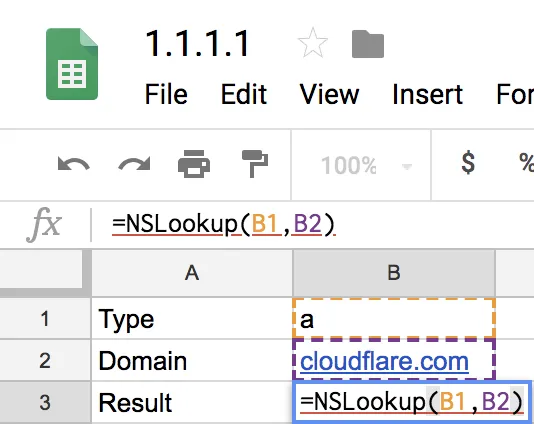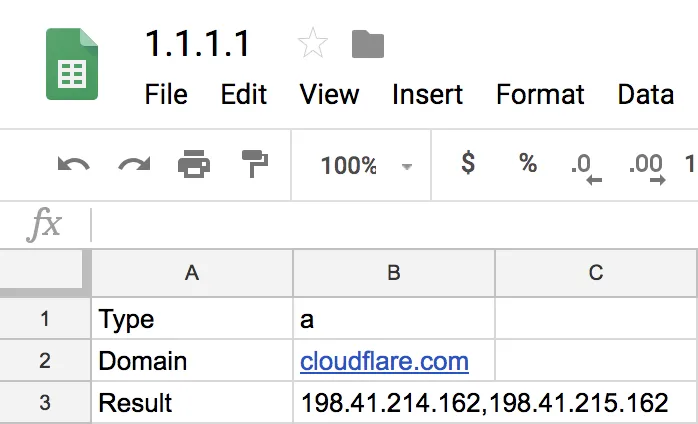DNS in Google Sheets
1.1.1.1 works directly inside Google Sheets. To get started, create a Google Function ↗ with the following code:
function NSLookup(type, domain) {
if (typeof type == 'undefined') { throw new Error('Missing parameter 1 dns type'); }
if (typeof domain == 'undefined') { throw new Error('Missing parameter 2 domain name'); }
type = type.toUpperCase();
var url = 'https://cloudflare-dns.com/dns-query?name=' + encodeURIComponent(domain) + '&type=' + encodeURIComponent(type);
var options = { muteHttpExceptions: true, headers: { accept: "application/dns-json" } };
var result = UrlFetchApp.fetch(url, options); var rc = result.getResponseCode(); var resultText = result.getContentText();
if (rc !== 200) { throw new Error(rc); }
var errors = [ { name: "NoError", description: "No Error"}, // 0 { name: "FormErr", description: "Format Error"}, // 1 { name: "ServFail", description: "Server Failure"}, // 2 { name: "NXDomain", description: "Non-Existent Domain"}, // 3 { name: "NotImp", description: "Not Implemented"}, // 4 { name: "Refused", description: "Query Refused"}, // 5 { name: "YXDomain", description: "Name Exists when it should not"}, // 6 { name: "YXRRSet", description: "RR Set Exists when it should not"}, // 7 { name: "NXRRSet", description: "RR Set that should exist does not"}, // 8 { name: "NotAuth", description: "Not Authorized"} // 9 ];
var response = JSON.parse(resultText);
if (response.Status !== 0) { return errors[response.Status].name; }
var outputData = [];
for (var i in response.Answer) { outputData.push(response.Answer[i].data); }
var outputString = outputData.join(',');
return outputString;}When you feed the function NSLookup a record type and a domain, you will get a DNS record value in the cell you called NSLookup.
Supported DNS record types
AAAAACAACNAMEDSDNSKEYMXNSNSECNSEC3RRSIGSOATXT
For example, typing:
NSLookup(B1, B2)Or - depending on your regional settings - you may have to use this formula:
NSLookup(B1; B2)
Returns
198.41.214.162, 198.41.215.162